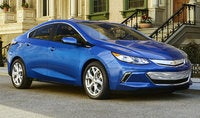2010 Volt
How much will the 2010 Chevrolet volt cost? What will the tax incentive amount be? Will the 'redundant' electrical systems for the power hungry climate control system, radio, wipers, etc. run off the main battery or will they require the engine running? If they do run off the battery, does the 40mi electric range still hold true?
Also, is there a high-ball and low-ball number for how far the Volt will go in electric-only, or is the 40mi design goal the only number that is known on the electric range at this time?
5 Answers
Check the current issue of motor trend, there is a pretty good article in there about the car. Personally, I'd not want it or a hybrid. The electric car is only good for 40 miles and hybrids have more disadvantages than advantages; plus, if you're ever in an accident with one, emergency workers are very cautious around that much amperage. Most people dump their hybrids when it's time to replace the batteries. The money you saved on gasoline bites you in the ass to replace the batteries!
Cost and tax incentives are as of yet, undecided. Simply put, Chevy is waiting to see actual market conditions at roll out (and how much they really end up costing to produce. I'm not sure about how the electrical systems are related, but I imagine the electrical accessories have to feed off the driving battery somewhere (what happens if there is a dedicated accessory battery, but it gets used up: how can you drive without headlights? And how would the defrost work without hot coolant from the gasoline engine- it HAS to use electric coils to pass state inspections or turn the engine on whenever you run that.) And for the 40 miles: it's definitely a very high estimate. I guarantee in city it will go no more than 20 miles because of all the accelerating from stop. And on the highway, it will have to kick in the gas engine to go 55+. Simply put: if you are thinking about buying one WAIT until the first consumers who HAVE to have it realize how good/bad of a choice they made
I remember seeing that the battery back in the volt has redundant saftey systems between the cell blocks. Unlike the early hybrids where nothing existed. Basically if the main power shorts over the body of the car the battery will switch itself off in multiple places breaking the circuit. If it's still charged then it'll be only a small fraction of what the battery pack is capable of. We'll see how many of the safety systems designed make it to the final product, and how effect they are. As to battery life, I personally see prices dropping fairly rabidly for battery replacement. Yeah it'll always be a big expense, but 1,500 every 8 years isn't that bad. Especially with a PHEV since the cost of electricity per mile is significantly less even that $1.70 gas prices. Granted straight hybrids, I agree, don't make up their cost with savings, but for someone who has a PHEV, such as the Volt, and can keep the majority of their driving on straight electricity, the batteries will cost less in the long run. I think industry needs to look at ways of extending the life of batteries though, alot of research has been done, but nothing really implemented. The one that seems most promising is utilizing ultra-capacitors for efficiently storing and discharging the energy from regen. braking. It's saves a charge and discharge of the battery every time you stop and they are lightweight enough and small enough to be implemented in small places. Once again to say now would be to predict the future. --------------Don't want to make two posts.---------------- As to running separate batteries for accessories, that would be stupid. Batteries weigh too much or cost too much as it is. DC/DC converters to step the voltage down... Compared to the actual power used to run the car the things you mentioned are tiny. AC would be the only 'major' drain... As to the 40mi range only real life testing will show how accurate that is. As with all hybrids they do best at a constant speed below 45 mph... In city driving as long as you take your time accelerating it should stay under battery only power, and regen. braking is reaching amazing efficiencies but the efficiency level drops the quicker you stop. That being said GM has been known for making fairly conservative estimates so I'd personally expect to see near that level. (Odd thing no one brings up in these arguments is what if it does work well? If you drive 20 miles a day the life of the gas in the tank becomes an issue. Go on a trip 30 miles from home the engine tries to turn on... Stabil ought to take a marking cue here.) One last thing. It's the first year of a new model, expect bugs and higher prices. 2-3 years down the road it'll be a better and cheaper car. Real world drivers do a great job of finding flaws you'd never find in a lab. They just don't test for junior shoving Cheetos into a wiring harness.
I was mistaken!!!! The article appeared in the December 2008 issue of automobile magazine. Also in the same issue was an article about the newest VW diesel that was quite interesting. A couple managed 59 MPG with it!! BUT!! It seems the most effecient powerplant in the near future is the turbo diesel produced by HONDA available in 2010. There is an article about that as well! Sorry about the bad intel!
Yeah but those article never mention the Loremo. I'm waiting for that thing. The GT looks like it'll perform about even with a 2.0l 914, not fast but fun, and get 80mpg diesel. The weird 2+2 seating could be a deal breaker though :-\
